Back Showing posts tagged #socialistrepublic
"What's Another Tour? No to Racist Rugby"
An article from Socialist Republic, paper of Peoples Democracy, opposing an Irish rugby tour of apartheid South Africa in 1981.
New document:
Socialist Republic, November 1977.
Paper of the Movement for a Socialist Republic.
https://www.leftarchive.ie/document/6414/
#IrishLeft #SocialistRepublic #MovementForASocialistRepublic #Trotskyism #FourthInternational
Socialist Republic, November 1977 (1977) — Movement for a Socialist Republic
Irish Left Archive
"What's Another Tour? No To Racist Rugby"
From 1981, an article in Socialist Republic on a proposed tour of apartheid South Africa for the British & Irish Lions rugby team. The team had toured in 1980 despite widespread opposition (including from the governments of both the UK and Ireland).
Socialist Republic was the magazine of Peoples Democracy, who were then the Irish affiliate of the Fourth International.
#Rugby #Ireland #Politics #IrishLeftArchive #SocialistRepublic #PeoplesDemocracy
From 1977: "Church Launches New Attack on Women"
Socialist Republic on the establishment of "Cura" by the catholic church, and the campaign for abortion, contraception and reproductive rights.
https://www.leftarchive.ie/document/view/2261/?page=8
Socialist Republic was the paper of the Movement for a Socialist Republic, and later of People's Democracy when the two organisations merged in 1978.
Cura closed in 2018 when new regulations and accreditation requirements were brought in.
#IrishPolitics #CatholicChurch #SocialistRepublic #MovementForASocialistRepublic #IrishLeftArchive
View Document: Socialist Republic, April-May 1977 - Movement for a Socialist Republic
Irish Left Archive
From the first issue of Socialist Republic in 1988, an interview with the Irish People's Liberation Organisation (IPLO).
Published by the Socialist Republican Collective, the political arm of the IPLO, which split from the INLA in 1986.
https://www.leftarchive.ie/document/view/565/?page=6
#IrishPolitics #IrishHistory #SocialistRepublic #SocialistRepublicanCollective #IPLO #IrishLeftArchive
View Document: Socialist Republican, Vol. 1, No. 1 - Socialist Republican Collective
Irish Left Archive
In a subsequent issue, the same author follows up with this article linking gay rights, women's rights and national liberation.
"Gay Rights and National Rights"
#Cork #GayRights #NationalRights #SocialistRepublic #PeoplesDemocracy #IrishLeftArchive
"Gay Society Banned!"
A report on the banning of the gay student society in University College Cork, from Socialist Republic, paper of Peoples' Democracy, 1981, by Martin Mac An Ghoill.
#Cork #GayRights #LGBTQ #SocialistRepublic #PeoplesDemocracy
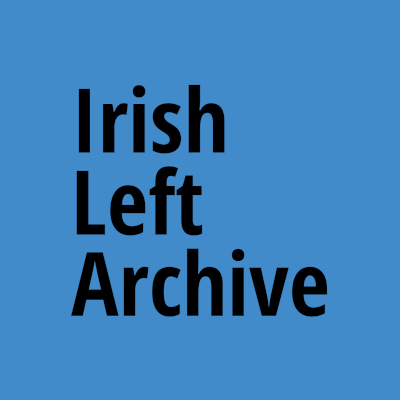
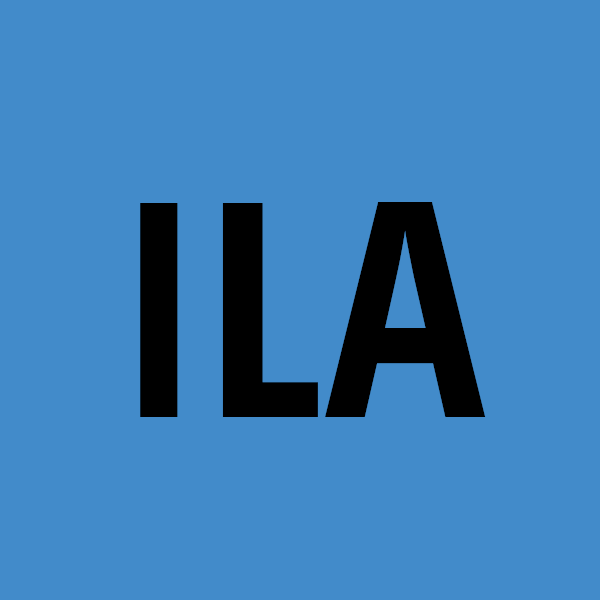
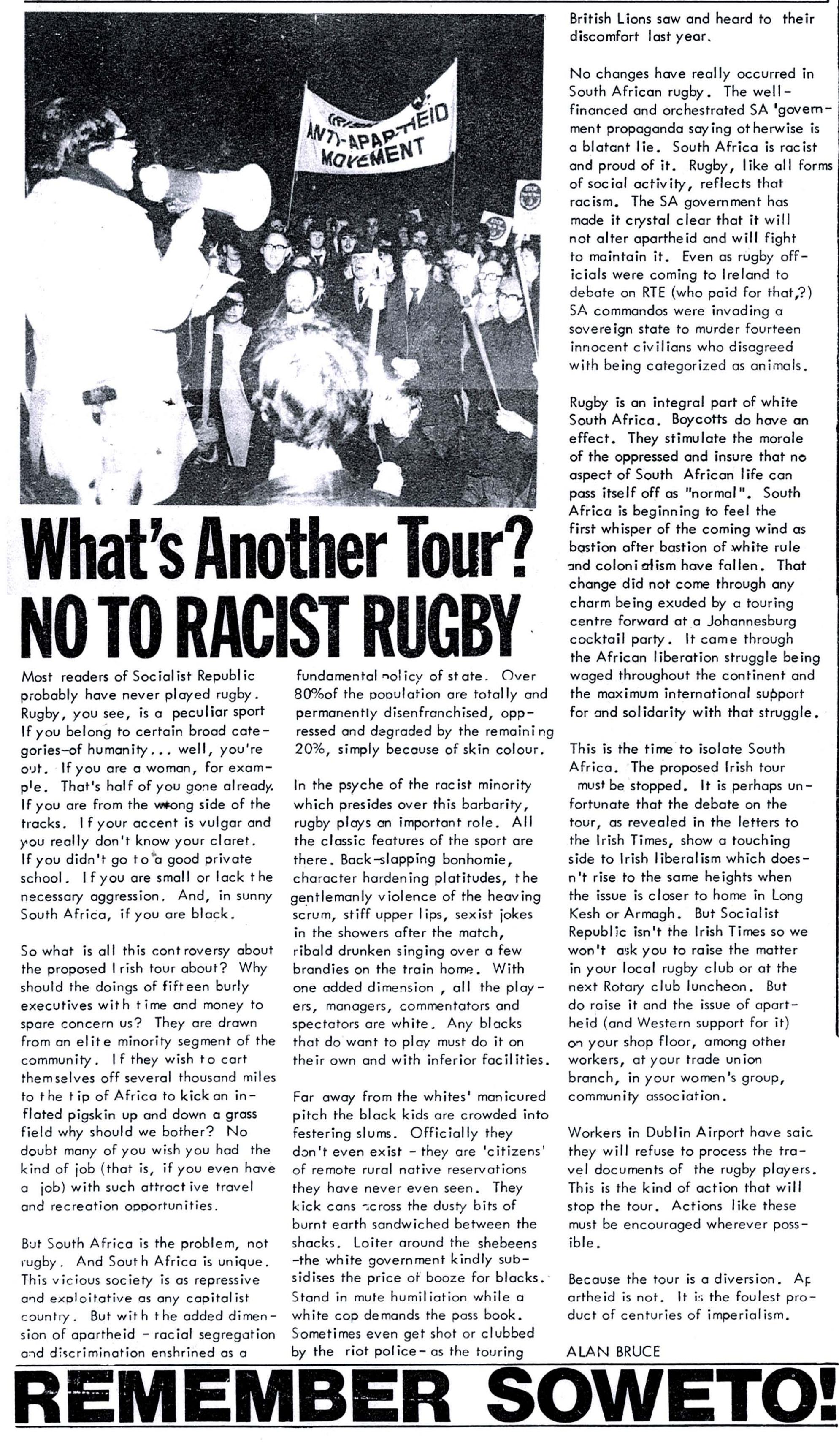

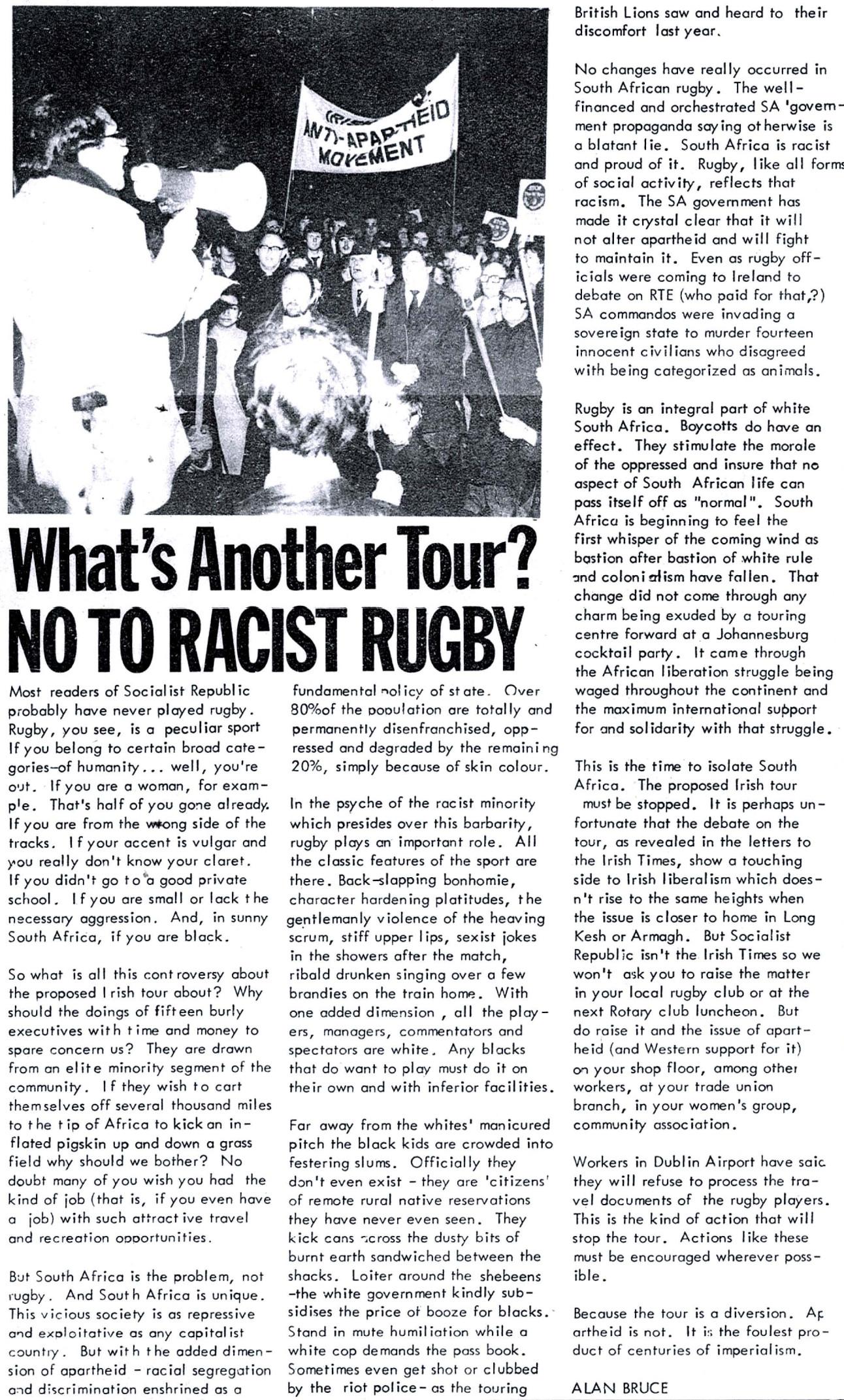

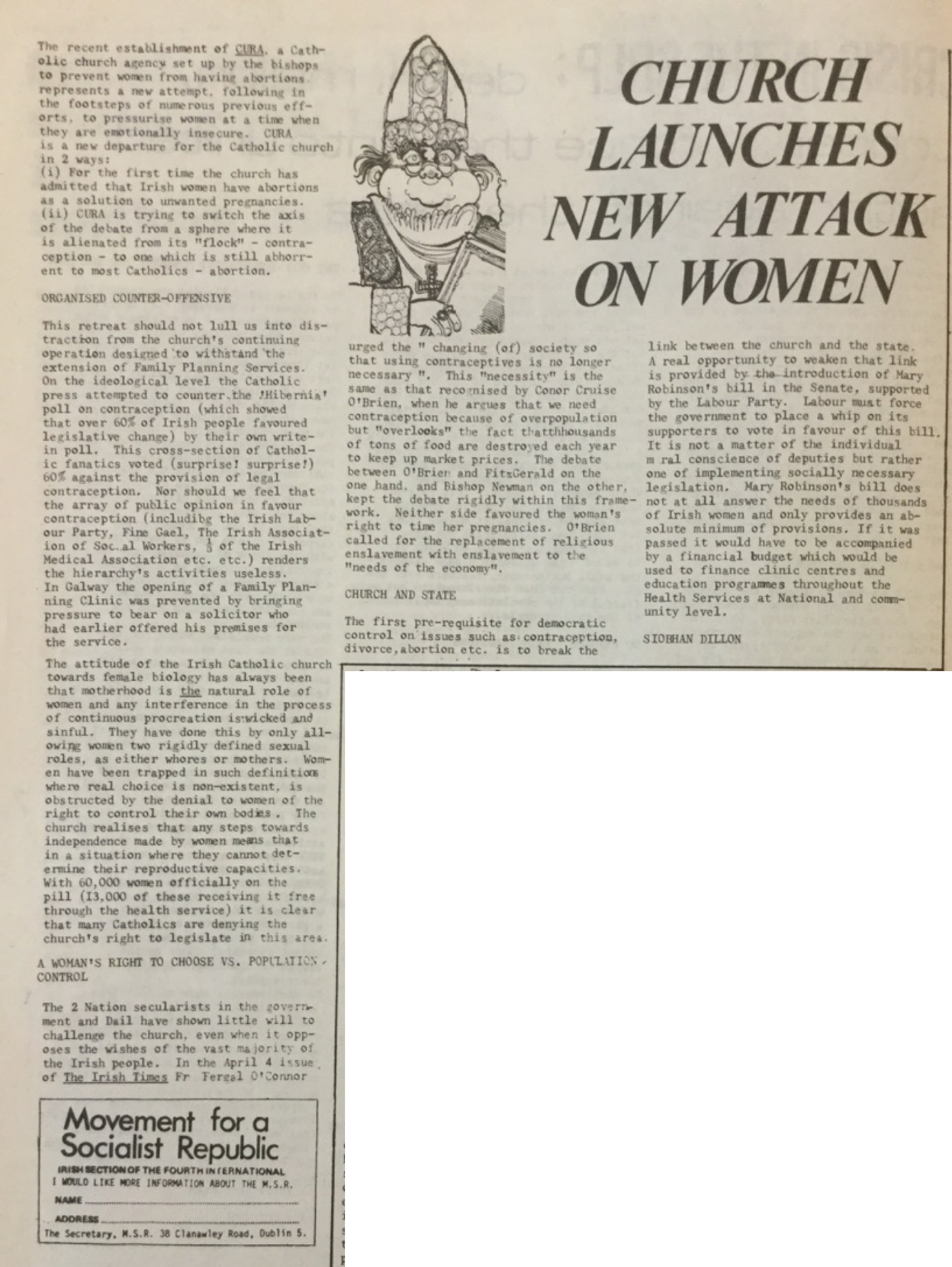

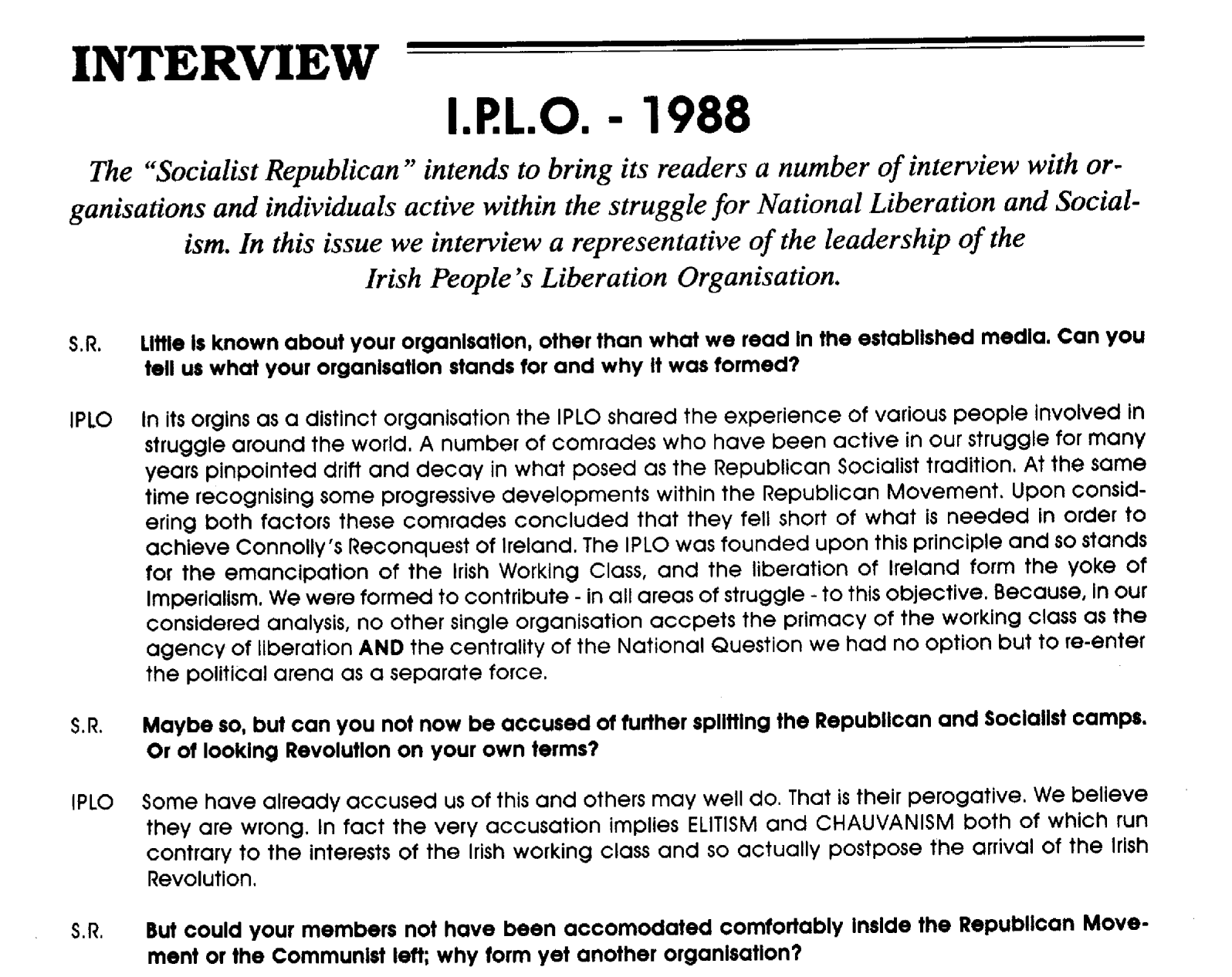
![Gay Rights and National Rights
Following on from our report of the banning of a Gay Society in University College, Cork in Vol 4 No. 2 of Socialist Republic we have had requests from readers to explain the nature of the stu [sic] struggle for personal freedom. Readers of Socialist Republic will be aware of our view that the struggle for women’s liberation is part of the struggle for national liberation. We have consistently argued that feminists should recognise that the domination of women by men in this society and the denial of democratic rights to women is part of a broader domination of the Irish people by British imperialism.
[I]n this article MARTIN Mac An GHOILL shows how this also applies to the persecution of Gay people. Any denial of the rights of Gay people is an attack on a section of the Irish people. No Irish person can justifiably support it.
On a world scale the last fifteen years have been dominated by two great struggles — the struggle of oppressed people to overthrow the exploitation of imperialism and the struggle of women for full control over their own lives. In Ireland too, these two interconnected struggles have fired the imagination of youth and begun a debate which will outlive the end of Capitalism. That debate is centred around the various ways in which people can live 2nd the relationships they have with others. Are we to continue the exploitative and oppressive personal relationships established as the norm under capitalism, or will be forced to change our whole system of social and sexual relations as the foundations of the new society are laid?
For a very long time socialists and other progressives ignored this aspect of the struggle for liberation. As part of and affected by male dominated society they chose only to see bl an economic exploitation of women. They therefore ignored the revolutionary potential of the struggle for personal and social freedom and assumed that equal pay was the be-all i and the end-all of women’s liberation. There is no doubt that this failure to understand male domination has an objective basis particularly in Ireland, where all freedom of expression eventually hits the stone wall of the Catholic Church. The Famine (Britain’s neutron bomb of the 19th century), broke the back of Irish militancy and resistance for a whole generation. The only social organisation to survive intact was ® the Catholic Church, which quickly moved to establish control over all aspects of Irish society, including the personal relationships between people. Partition entrenched this position and along with the Protestant churches in the 6 Counties ensured that a blanket morality existed which persecuted and excommunicated all those who had different ideas about achieving personal happiness and fulfillment.
It wasn’t until the world-wide rebellion of youth in the 1960s that any real challenge was made to the forced heterosexuality encouraged by the churches. In this context women and young people demanded as of right control of their own bodies and lives. Gay people too, felt the confidence to break with the traditional stereotype of male/female couples and asserted their right to choose their own lifestyle.
How is Gay Liberation linked to National Liberation? On one level it is obvious that anything which loosens the control of one group over another must expand whatever democratic rights already exist. Thus gay people who are brought into the struggle for the democratic right to choose who they will live with push forward the struggle for all democratic rights and give self-determination a concrete expression. On a deeper level gays contribute to the struggle for national liberation by challenging the very foundations of the two reactionary statelets. Partition is the mechanism whereby much of the social and democratic legislation wrested from the British state by the British working class was denied to the Irish people. In refusing to accept an imposed sexuality and moral code the struggle for gay liberation exposes the nature of partition and the forces defending it.
But gays are not the only ones to suffer. Nor are they the only ones to fight back. For the past twelve years the Irish people have waged a war of national liberation against British imperialism, first through open resistance and latterly through massive mobilisations in defence of the political prisoners. Gays must now take up a debate with the forces leading that resistance to show where the demands of gay people figure in the programme of the Irish revolution. Equally those sympathetic to the struggle of gay people within the national liberation struggle must show that the demands of gay people can never be achieved except in a deformed way, while partition and the two reactionary states exist. It is a debate which can only be mutually beneficial.](https://posts.leftarchive.ie/attachments/thumbnails/598bea810bece056d6223f91ed7fb06a09ea8b29fec4087b5a1d2904e71cff2b/GayRights_NationalRights.jpeg)
![Gay Society Banned!
In an unprecedented decision, the Joint Board of University College, Cork refused an application by the newly formed GAY SOCIETY for recognition as a college society.
The president of the college, Sean Feegan, has banned the Gay Society from meeting in college. The refusal of recognition means that no college money will be made avail able to the society and in general the work of the society will be made more difficult. '
When the vote was taken the three student representatives voted in favour while the four academic staff voted against without giving any ~ reason. However, it is generally felt that the reason had to do with the sexual predjudices [sic] of the academics. In an earlier decision they again voted en bloc to stop the purchase of GAY NEWS, SPARE RIB and other progressive publications for the student reading rooms saying that Charles Kerrigan (the gay general secretary of the S.U.) was foisting his 'degeneracy' on others.
The anti-gay views of the college authorities have not gone without challenge. A leaflet calling on students to protest at violation of gay and human rights has been produced by the Gay Society.
Many other societies have passed motions condemning the action and the Students Union, Class Council has promised continued financial assistance.
The emergence of an active Gay ,l Society in UCC is one of several progressive developments in the Cork area. The Gay community has become more open and vocal. The spearhead of this radicalisation has been the Cork Gay Collective.
Over the past eight months this group has realised through discussion that there can be no liberation without the direct participation in this process. Consequently they have initiatives including interviews on local radio, a lobby of the Labour Party and, most significantly, a forum for gay activists at the Glencree Reconciliation Centre. This led to a mandate being given to the Collective to organise a national conference of gay activists.
Already a planning committee, consisting of members of the Collective, the Gay Society and individual members of the Cork Irish Gay Rights Movement (IGRM) has been set up. It is hoped to have open forums, films and workshops as well as general discussion and socials. Gays from all 32 counties are invited and many are expected from Britain and the Continent.
Martin Mac An Ghoill
---
Letters of protest should be sent to: Joint Board, University College, Cork. Send copies to : Gaysoc. c/o Students Union, UCC.](https://posts.leftarchive.ie/attachments/thumbnails/3b31516d001c6586b5064e23b224423c2c0a6e6a5852b6e413c8f9ca469cb605/gay_society_banned.jpeg)